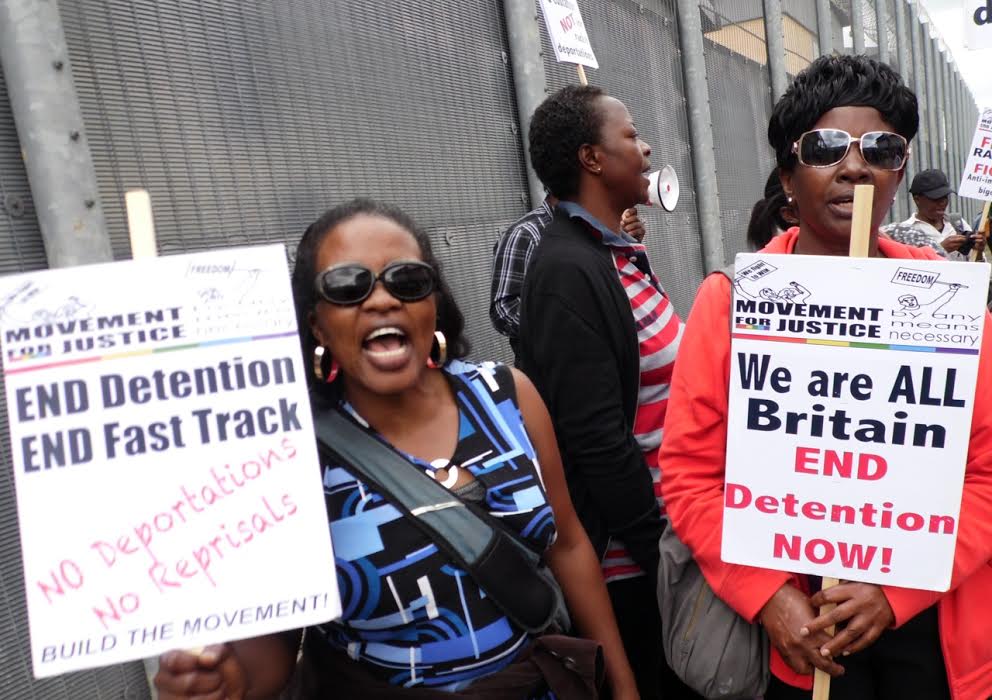From: http://rabble.org.uk/hunger-strikes-spread-to-8-detention-centres/

As of yesterday (Sunday 15 March) we had heard of hunger strikes and other protests taking place in 8 detention centres across the UK, as prisoners started refusing food in Dungavel (Scotland, near Glasgow) and Dover. There is now rebellion in the majority of the UK’s migration prisons.
The other six known to be protesting are Yarl’s Wood (Bedfordshire), Harmondsworth and Colnbrook (Heathrow airport), Tinsley House and Brook House (near Gatwick Airport). (See previous report here.)
The new website Detained Voices is spreading the voices of people inside. Here are just a few fragments from the past days, there is much more on that site.
Colnbrook. Thursday March 12:
“At Colnebrook, more than 20 people on hungerstrike. And we go outside but they officers have closed the doors and we can’t go outside. I’ve strike for 5 days and no one has asked about us. No one cares. We eat or no eat, release or no release no one cares. It’s very bad here. You can’t believe it. It’s very bad for everything.”
Harmondsworth. Friday March 13:
“The response to the protest is like, they don’t have ears to hear it, they don’t have heart to beat.
“The water was shut for the whole day. No it wasn’t for maintenance work because if you see they shut the whole unit. The complete wing, was shut for the whole day. Because if you see, there are also Muslim people over there who used to pray five times a day and they couldn’t’ use the toilet, and they couldn’t use the toilet, and they couldn’t use water or anything to pray. I hear that they say it was shut for an hour or so for some six rooms but no it was shut for whole wing not only for six rooms, and it was shut for all day
“They don’t care what we are doing inside. We are dying. Because of protest yesterday, one of my mate went to hospital because of that, because he got ill. He started vomiting because he was not eating. He was on hunger strike, he got ill, and started vomiting, and now we don’t know where he is.” …
Dover. Friday March 13:
“We are not eating in Dover Detention – we having a strike. There are half of the people are already on strike. We are organising and talking with all the people. We are human beings.”
Dungavel. Friday March 13:
“Around 60 people have been on a foodstrike since Monday in Dungavel. They are not eating because they are upset at the way they have been treated for a long time. W want to see the immigration minister and we want to talk about a lot of things that have gone wrong. There are lot of things to ask:
- Why are the case workers telling lies. In bail summaries they tell lies.
- We want a time limit on how long you can detain people.
- Obviously, most of the people are from London and we are near Glasgow. About 80% are a from London and so we are away from your families and friends. It’s hard to drive and very expensive.
- The conditions we are living in – 8 people in one room. Too many people in one room.
Someone has already been to hospital and they’ve put him in a secure room for monitoring.”
Dungavel. Sunday March 15:
“There are about 70 people are still protesting in Dungavel. They are refusing to go to the kitchen to eat. There was a protest from people outside. There was the police and STV. We can’t really see them because of the walls but it is good to hear them. It shows the message is getting across, what we are trying to achieve.”As these statements make clear, the approach of the prison authorities is brutal force and isolation, knowing that few will hear the voices coming across the walls.
Active solidarity is vital.
Prisoners ask again and again that we spread their words and make more people know what is happening inside these largely forgotten prisons.
Just a small group or an individual shouting across the walls can help boost the strength of those on hunger strike. At most UK detention centres it is still possible to get close up to the cells where people are kept, so we can communicate visually and with sound.
But the border regime is all around us. We can attack it ourselves wherever we are.
The UK Home Office has signing and admin offices, holding cells, and bases from which they launch dawn raids, in many towns. Here is a list of some addresses for their “enforcement” teams.
Much of their work of running the detention centres is contracted out to private companies including Mitie, G4S, and Serco, which also have offices across the country and globally.


 The racism and sexism at the heart of the UK’s secret network of immigration detention centres was thoroughly exposed by Channel 4 News on the 2nd March 2015. That same week the system was further undermined by the report of the parliamentary detention inquiry that recommended radical changes to who is detained and for how long.
The racism and sexism at the heart of the UK’s secret network of immigration detention centres was thoroughly exposed by Channel 4 News on the 2nd March 2015. That same week the system was further undermined by the report of the parliamentary detention inquiry that recommended radical changes to who is detained and for how long.


